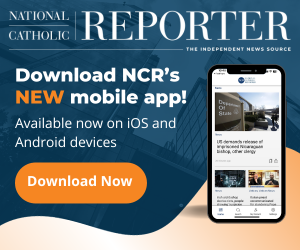'In Christ's resurrection, the earth itself arose.'Your weekly newsletter about faith and climate changeMarch 29, 2024  Fr. Christopher Dabu demonstrates to Highly Hangoma the importance of planting trees to restore degraded land in Chirundu, a town in the southern region of Zambia, on March 6. (Doreen Ajiambo) While there's no shortage of climate news that embodies narratives of unjust suffering and death — like Holy Week — several stories this week at EarthBeat align more with the ideas of resurrection and renewal that we find in the Easter season that begins this weekend. Theologian and Sister of St. Joseph Elizabeth Johnson wrote in her 2014 book Ask the Beasts: Darwin and the God of Love: "It is as if Earth were undergoing its agony in the garden, about to be crucified, and we, the disciples of Jesus, are curled up fast asleep." On a global and systemic scale, that often feels true. However, when we look closely at local communities in specific places, examples of people rising to the occasion to address the impacts of climate change in meaningful and effective ways abound. Freelance journalist Shadrack Omuka writes from Kenya about the faith-based Mother Earth Network founded by Fr. Herman Borg that is working to restore the Maragoli Forest. Read more: Faith-based Mother Earth Network aims to restore Maragoli Forest, and hope, in Kenya And Doreen Ajiambo, Africa and Middle East correspondent for Global Sisters Report, reports from Zambia — where she was on a climate change reporting fellowship with Catholic Relief Services — about how CRS Zambia is supporting farmers to restore soil nutrients to yield more crops as farms have become less fertile, caused in part by increased droughts and flooding exacerbated by climate change. Read more: CRS Zambia supports farmers restoring degraded land In both cases, efforts aimed at the restoration of ecosystems seek to contribute to the livelihood and flourishing of local communities, providing hope for the future of the land and those who call it home. "In Christ's resurrection, the earth itself arose," writes Johnson in her book, quoting Ambrose of Milan. May this Easter season be filled with such stories of rebirth. What else is new on EarthBeat: by Gina Christian, OSV News  by Taylar Dawn Stagner, Grist "Oak Flat is like Mount Sinai to us — our most sacred site where we connect with our Creator, our faith, our families and our land," said Wendsler Noise of Apache Stronghold, a nonprofit fighting to protect the area. "We vow to appeal to the Supreme Court."
What's happening in other climate news:Florida is about to erase climate change from most of its laws —Kate Yoder for Grist Athletes at This Summer's Paris Olympics Won't Have Air Conditioning —Laura Ratliff for Runner's World How Two Top Car Salesmen Pitch EVs, One in Trump Country and One on Biden's Turf —Dan Gearino for Inside Climate News Study: No top oil companies aligned with Paris climate goals —Zack Budryk for The Hill The surprising reasons why Big Oil may not want a second Trump term —Maxine Joselow for The Washington Post US awards record $6 billion to back industrial emissions reduction projects —Andrea Shalal and David Shepardson for Reuters
|
In this blog, we'll look at how men and women at serving Jesus Christ both at home and abroad. We'll focus on how God is using their work to transform the lives of people all over the world.
Friday, March 29, 2024
EarthBeat Weekly: 'In Christ's resurrection, the earth itself arose.'
WCC NEWS: Interview: WCC commissioner Kevin Maina shares perspectives from UN Environment Assembly
| ||||||||||||||||||||||||||
|
Thursday, March 28, 2024
WCC NEWS: WCC expresses deep concern for human rights in Haiti
| ||||||||||||||||||||||||||
|
Wednesday, March 27, 2024
Living into Right Relations: March 2024
| |||||||||||||||||||||||||||||||
| |||||||||||||||||||||||||||||||
|
WCC News: WCC condemns violence against communities in Myanmar
The World Council of Churches (WCC) condemns military strikes against civilians and civilian areas in Myanmar. Photo: Albin Hillert/WCC 17 ...

-
Genocide, Worker Rights, and White Christian Nationalism NCC Newsletter July 2, 2021 Click here to donate Recent Interview with Jim Winkl...
-
As we enter this sacred season — a time when many traditions gather to celebrate light in the darkness, rest after a long year, and the endu...
-
View this email in your browser Welcome to the Truth and Action Roundup, a reliable weekly source of information, inspiration, and action f...


 Stephanie Clary
Stephanie Clary










